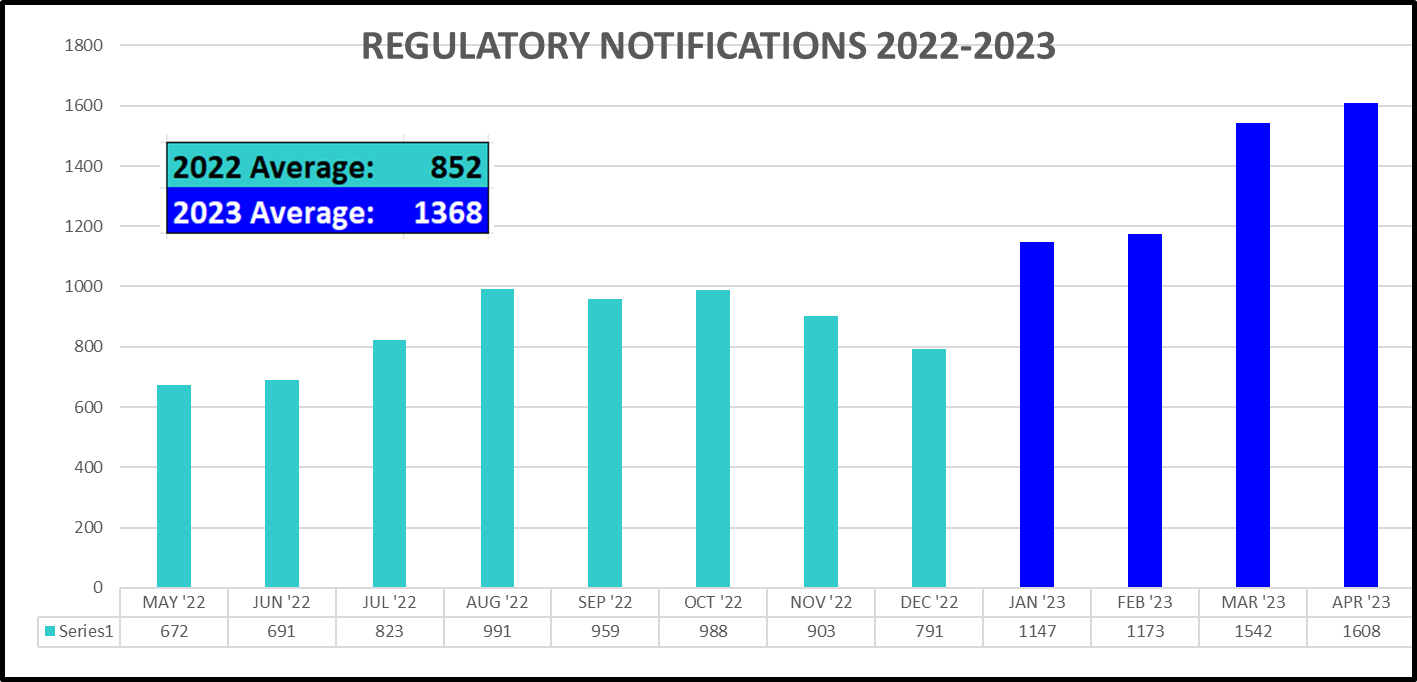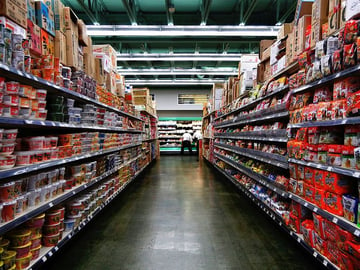Protecting the health and well-being of consumers is always a top priority in the food industry. And while the Food and Drug Administration (FDA) continues to implement regulations to prioritize the safety of U.S. consumers, some food companies are finding it challenging to keep up with changing regulations.
Are Food Product Recalls on the Rise?
According to a recent regulatory analysis from Trustwell, the first part of 2023 has seen a 40% rise in regulatory notices to food companies compared to 2022. While not all of these notices have resulted in food product recalls or withdrawals, the data does suggest that increased regulations mean increased challenges for businesses to remain compliant. And 2023 did see the addition of sesame as a required allergen for declaration, which may be a catalyst for some of these notices.

However, there are definitely patterns when it comes to food product recalls—and we’ve seen a major increase over the past few years. In 2022, it was reported that the FDA saw a 700% increase in recalled “units” compared to 2021.
Most food product recalls tend to fall into one of three common scenarios: mislabeled products, undisclosed allergens, or contamination issues. Recalls of food products pose significant risks to consumer health and can have severe consequences for the reputation and financial stability of food companies. As the rates of recalls continue to rise, it becomes crucial for food companies to address the underlying causes and take proactive steps to prevent them.
In this blog, we’ll explore the most common types of recalls, and how Trustwell’s solutions like FoodLogiQ and Genesis Foods, can help companies remain compliant and prevent future recall issues.
How Does a Recall Work?
Don’t get caught unprepared – the recall process can be stressful and complicated. Luckily, we’re offering a free mock recall event. Tune in to learn how you can manage a withdrawal across locations and partners from a single dashboard and access additional recall tools using FoodLogiQ Recall.
Mastering Recall Response: Live Demo of FoodLogiQ Recall in Action
Mislabeled Products and Undeclared Allergens: The Erosion of Consumer Trust
Food product labels are essential for communicating the nutritional value of a product, and the ingredients consumers can expect to consume. For consumers with serious food allergies, ingredient statements are vital to protect themselves from consuming potentially hazardous foods. As a result, mislabeled products and a subsequent recall due to mislabeling can erode consumer trust. And for people with serious allergies, mislabeled products can pose significant health risks to consumers, including severe allergic reactions, medical emergencies, and even fatalities.
Mislabeled products can refer to incorrect nutritional information, undeclared allergens, or inaccurate ingredients statements. Recalls due to mislabeled allergens in products have resulted in reputational damage and financial losses for many food companies. In 2020, half of USDA and FDA recalls (about 190 recalls in total) were due to mislabeling according to the Food Industry Association.
How to Avoid Mislabeled Product Recalls
To avoid mislabeled allergens, food companies must implement rigorous processes for ingredient sourcing, supplier communication, and allergen testing. This process includes many moving parts and many industry leaders rely on quality management or communication platforms to manage their process and ensure compliance throughout their supply chain. Systems like FoodLogiQ Compliance can help companies communicate their quality control measures to suppliers, help maintain compliance when onboarding new suppliers, and simplify the process for sourcing and communication if ingredients change.
Additionally, industry leaders can enable comprehensive food labeling solutions to ensure accuracy and transparency in product recipes. While many companies rely on enterprise resource planning (ERP) software to simplify labeling with an “all in one solution,” these systems often lack the built-in government regulation checks that companies need to remain compliant. As a result, they could produce hundreds of units with inaccurate labels, resulting in a costly recall.
However, Genesis Foods formulation and labeling software is a comprehensive tool that simplifies nutrition analysis and automates compliant Nutrition Facts labels and ingredient statements. The software includes built-in checks for allergens, which food companies can use as an extra reminder to review their ingredient statements for potential allergen declarations.
Food Contamination: Safeguarding Public Health
Some of the most high-profile recalls are due to serious foodborne illnesses. For example, the 2018 romaine lettuce recall was due to E.coli contamination, while the 2022 infant formula recall was due to Cronobacter illness. While these contamination recalls tend to get the most news, there are many other forms of food contamination that result in recalls as well.
Contaminants can originate from various sources, including microbial pathogens, foreign objects (such as metal or glass), allergen cross-contamination, and chemical substances. Unfortunately, the impact of these recalls can be long-lasting, resulting in consumers avoiding a recalled brand for years. In 2021, our consumer sentiment on food recall responsiveness report found nearly 18% of consumers will never visit or use a brand again after a food recall. Another 43% of respondents said they would revisit the brand after a few months.
How to Avoid Food Contamination Recalls
To prevent contaminated goods from reaching consumers, companies must prioritize strict quality control measures throughout their supply chain. This can include following Current Good Manufacturing Processes (CGMP), establishing a FSMA food safety plan, and establishing strict food safety and Hazard Analysis Critical Control Point (HACCP) measures, as directed by FDA food code.
Additionally, companies can use traceability systems and quality incident tracking systems to have more control over their products as they travel along the supply chain. With a system that can track at the batch-lot level, companies can have an easier time finding flagged products, identifying potential incidents like spoiled food before they reach shelves, and simplifying their traceability processes.
Implementing comprehensive tracking and tracing systems, conducting regular inspections, and maintaining rigorous hygiene protocols are crucial steps. But so is identifying contaminated products at the lot-level to minimize the impact of recalls when they happen.
Using a recall management system like FoodLogiQ Recall allows companies to swiftly identify and isolate contaminated products down to their specific batches, empowering supply chain partners with the ability to pull the contaminated products, minimize the financial impact, and prevent potential foodborne illnesses from reaching consumers. And when it comes to withdrawing products, FoodLogiQ Recall offers a single dashboard where you can watch the withdrawal process happen in real-time across all locations and partners.
Take Proactive Steps to Avoid Food Product Recalls
As the rates of food recalls continue to rise, food companies must prioritize proactive measures to prevent potential risks and protect their consumers. Mislabeled products, contaminated goods, and non-disclosed allergens are some of the most common causes of recalls, each with severe consequences for both consumer health and brand reputation.
By leveraging innovative solutions from Trustwell, food companies can streamline their processes, enhance transparency, and mitigate the risk of recalls. Taking action to implement robust systems for label accuracy, quality control, and allergen management is essential to maintaining consumer trust and regulatory compliance. Protecting the health and well-being of consumers should be the utmost priority for all food companies, and implementing proactive recall prevention strategies is an integral part of achieving that goal. If you’re curious to learn more about Trustwell’s solutions for recall management and prevention, contact our team today to schedule a free demo.
Other posts you might be interested in
View All Posts
Recall
5 min read
| July 13, 2018
Food Recall Management: How Food Recalls Affect Consumer Buying Habits and What You Can Do About It
Read More
Food Industry
7 min read
| June 29, 2022
Minimizing the Impact of Food Product Recalls
Read More
Food Industry
4 min read
| August 3, 2016

